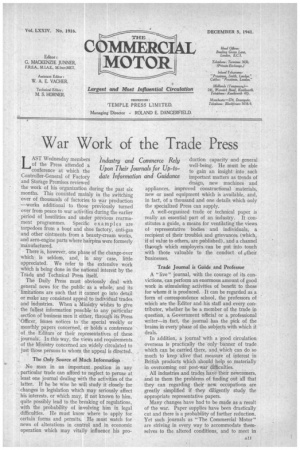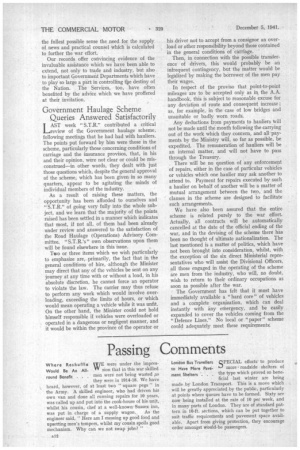War Work of the Trade Press
Page 13

Page 14

If you've noticed an error in this article please click here to report it so we can fix it.
LAST Wednesday members of the Press attended a conference at which the Controller-General of Factory and Storage Premises reviewed the work of his organization during the past six months. This consisted mainly in the switching over of thousands of factories to war production —works additional to those previously turned over from peace to war activities during the earlier period of hostilities and under previous rearmament programmes. Specific examples are torpedoes from a boot and shoe factory, anti-gas and other ointments from a beauty-cream works, and aero-engine parts where hairpins were formerly manufactured.
There is, however, one phase of the change-over which is seldom, and, in any case, little appreciated. We refer to the extensive work which is being done in the national interest by the Trade and Technical Press itself.
The Daily Press must obviously deal with general news for the public as a whole, and its limitations are such that it cannot go into detail or make any consistent appeal to individual trades and industries. When a Ministry wishes to give the fullest information possible to any particular section of business men it either, through its Press Officer, issues notices to the special weekly or monthly papers concerned, or holds a conference of the Editors or their representatives of these journals. In this way, the views and requirements of the Ministry concerned are widely circulated to just those persons to whom the appeal is directed.
The Only Source of Much Information No man in an important . position in any particular trade can afford to neglect to peruse at least one journal dealing with the activities of the latter. If he be wise he will study it closely for changes in legislation which may seriously affect his interests, or which may, if not known to him, quite possibly lead to the breaking of regulations, with the probability of involving him in legal difficulties. He must know where to apply for certain forms and permits. He must watch for news of alterations in control and in economic operation which may vitally influence his pro duction capacity and general well-being. He must be able to gain an insight into such important matters as trends of design, new machines and appliances, improved constructional materials, new or used equipment which is available, and, in fact, of a thousand and one details which only the specialized Press can supply.
A well-organized trade or technical paper is really an essential part of an industry. It constitutes a guide, a means for ventilating the views of representative bodies and individuals, a recipient of their troublth and grievances (which, if of value to others, are published), and a channel though which employers can be put into touch with those valuable to the conduct of their businesses.
Trade Journal is Guide and Professor A "live" journal, with the courage of its convictions, can perform an enormous amount of good work in stimulating activities of benefit to those for whom it is produced. It can be regarded as a form of correspondence school, the professors of which are the Editor and his staff and every contributor, whether he be a member of the trade in question, a Government official or a professional writer—in fact, the journal has the pick of the brains in every phase of the subjects with which it deals.
In addition, a journal with a good circulation overseas is practically the only banner of trade which can be carried there, and which can do so much to keep alive that measure of interest in British products which should help so materially in overcoming our post-war difficulties.
. All industries and trades have their newcomers, and to them the problems of finding out all that they can regarding their new. occupations are greatly simplified if they diligently study the appropriate representative papers.
Many changes have had to be made as a result of the war. Paper supplies have been drastically cut and there is a probability of further reduction. Yet such journals as "The Commercial Motor" are striving in every way to accommodate themselves to the altered conditions, and to meet in the fullest possible sense the need for the supply of news and practical counsel which is calculated to further the war effort.
Our records offer convincing evidence of the invaluable assistance which we have been able to extend, not only to trade and industry, but also to important Government Departments which have to play so large a part in controlling tip destiny of the Nation. The Services, too, have often benefited by the advice which we have proffered at their invitation.
Government Haulage Scheme Queries Answered Satisfactorily
LAST week " S.T.R." contributed a critical review of the Government haulage scheme, following meetings that he had had with hauliers. The points put forward by him were those in the scheme, particularly those concerning conditions of carriage and the insurance provisos, that, in his and their opinion, were not clear or could be misconstrued—in other words, they dealt with just those questions which, despite the general approval of the scheme, which has been given in so many quarters, appear to be agitating the minds of individual members of the industry.
As a result of raising these matters, the opportunity has been afforded to ourselves and " S.T.R." of going very fully into the whole subject, and we learn that the majority of the points raised has been settled in a manner which indicates that most, if not all, of them had been already under review and answered to the satisfaction of the Road Haulage (Operations) Advisory Committee. " S.T.R.'s" own observations upon them will be found elsewhere in this issue.
Two or three items which we wish particularly to emphasize are, primarily, the fact that in the general conditions of hire, although the Minister may direct that any of the vehicles be sent on any journey at any time with or without a load, in his absolute discretion, he cannot force an operator to violate the law. The carrier may thus refuse to perform any work which would involve overloading, exceeding the limits of hours, or which would mean operating a vehicle while it was unfit. On the other hand, the Minister could not hold himself responsible if vehicles were overloaded or operated in a dangerous or negligent manner, and it would be within the province of the operator or his driver not to accept from a consignor an overload or other responsibility beyond those contained in the general conditions of carriage.
Then, in connection with the possible transference of drivers, this would probably be an infrequent contingency, but the matter would be legalized by making the borrower of the men pay their wages.
In respect of the proviso that point-to-point mileages are to be accepted only as in the A.A. handbook, this is subject to reasonable excuse for any deviation of route and consequent increase ; as, for example, in the case of low bridges and unsuitable or badly worn roads.
Any deductions from payments to hauliers will not be made until the month following the carrying out of the work which they concern, and all'payments by the Ministry will, so far as possible, be expedited. The remuneration of hauliers will be an internal matter, and will not have to pass through the Treasury.
There will be no question of any enforcement of repairs, either in the case of particular vehicles or vehicles which one haulier may ask another to attend to. Payment for repairs executed by such a haulier on behalf of another will be a matter of mutual arrangement between the two, and the clauses in the scheme are designed to facilitate such arrangements.
We have also been assured that the entire scheme is related purely to the war effort. Actually, all contracts will be automatically cancelled at the date of the official ending of the war, and in the devising of the scheme there has been no thought of ultimate nationalization. The last mentioned is a matter of politics, which have not been brought into consideration, whilst, with the exception of the six direct Ministerial representatives who will assist the Divisional Officers, all those engaged in the operating of the scheme are men from the industry, who will, no doubt, wish to return to their ordinary occupations as soon as possible after the war.
The Government has felt that it must have immediately available a " hard core " of vehicles and a complete organization, which can deal instantly with any emergency, and be easily expanded to cover the vehicles coming from the "Defence Lines." No local or " paper " scheme could adequately meet these requirements




















































